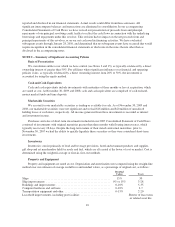Carnival Cruises 2009 Annual Report Download - page 21
Download and view the complete annual report
Please find page 21 of the 2009 Carnival Cruises annual report below. You can navigate through the pages in the report by either clicking on the pages listed below, or by using the keyword search tool below to find specific information within the annual report.Corporation to a group of major financial institutions, one of which includes American International Group Inc.
(“AIG”), who agreed to act as payment undertakers and directly pay these obligations. Accordingly, these
contingent obligations are considered extinguished, and neither the funds nor the contingent obligations have
been included in our accompanying Consolidated Balance Sheets.
In the event that Carnival Corporation were to default on its contingent obligations and assuming
performance by all other participants, we estimate that we would, as of November 30, 2009, be responsible for a
termination payment of approximately $95 million. In 2017 we have the right to exercise options that would
terminate these two LILO transactions at no cost to us.
In certain cases, if the credit ratings of the financial institutions who are directly paying the contingent
obligations fall below AA-, then Carnival Corporation will be required to replace these financial institutions with
other financial institutions whose credit ratings are at least AA or meet other specified credit requirements. In
such circumstances we would incur additional costs, although we estimate that they will be immaterial to our
financial statements. All of the financial institution payment undertakers subject to this AA- credit rating
threshold have credit ratings of AAA. If Carnival Corporation’s credit rating, which is BBB+, falls below BBB, it
will be required to provide a standby letter of credit for $67 million, or, alternatively, provide mortgages for this
aggregate amount on these two ships.
In September 2008, the credit ratings of AIG and its subsidiaries involved in one of the above LILO
transactions were downgraded from AA- to A-. As a result of this downgrade, AIG pledged collateral to support
its obligations as a payment undertaker under the terms of this LILO transaction and, accordingly, AIG is no
longer subject to the AA- credit rating threshold discussed above.
Carnival Corporation and AIG were also parties to a third LILO transaction. In September 2008, we
replaced AIG as the payment undertaker under this third LILO transaction by purchasing $80 million of U.S.
Treasury strip securities using funds substantially all of which were provided by AIG. In February 2009, Carnival
and the remaining participants voluntarily unwound this LILO transaction. Accordingly, the $80 million of long-
term U.S. Treasury strip securities that we held as collateral for our recorded LILO obligation were released to
extinguish this obligation. As a result of the unwinding of this third LILO transaction, we recorded a $15 million
nonoperating gain in February 2009, which had originally been deferred at the inception of the LILO transaction
and was being amortized over its term.
Contingent Obligations – Indemnifications
Some of the debt agreements that we enter into include indemnification provisions that obligate us to make
payments to the counterparty if certain events occur. These contingencies generally relate to changes in taxes and
changes in laws that increase lender capital costs and other similar costs. The indemnification clauses are often
standard contractual terms and were entered into in the normal course of business. There are no stated or notional
amounts included in the indemnification clauses and we are not able to estimate the maximum potential amount
of future payments, if any, under these indemnification clauses. We have not been required to make any material
payments under such indemnification clauses in the past and, under current circumstances, we do not believe a
request for material future indemnification payments is probable.
NOTE 8 – Income and Other Taxes
We are primarily foreign corporations engaged in the business of operating passenger vessels in
international transportation. Generally, income from or incidental to the international operation of vessels is
subject to preferential tax regimes in the countries where the vessel owning and operating companies are
incorporated, and generally exempt from income tax in other countries where the vessels call due to the
application of income tax treaties or domestic law which, in the U.S., is Section 883 of the Internal Revenue
20
























